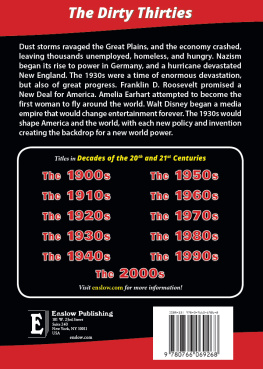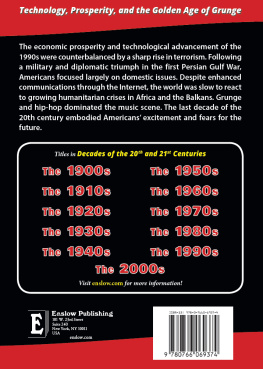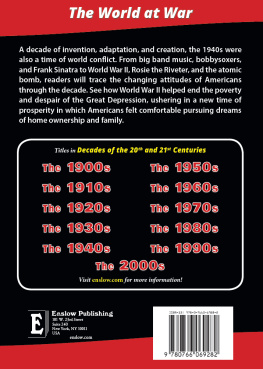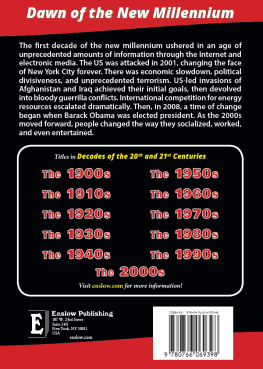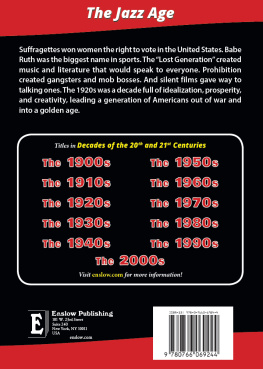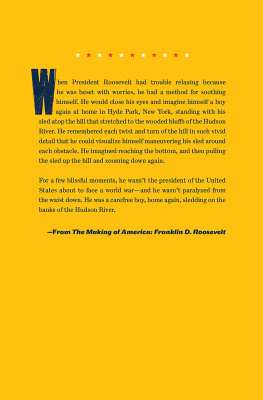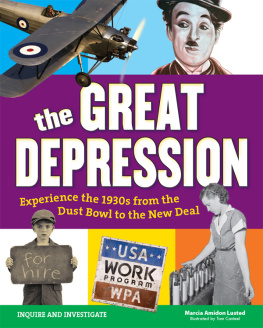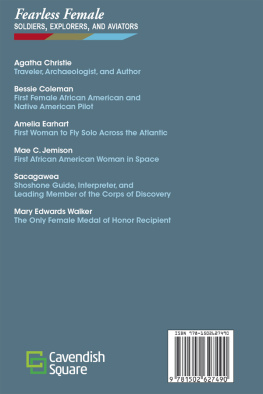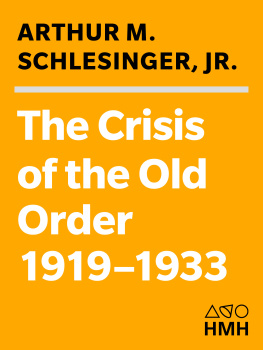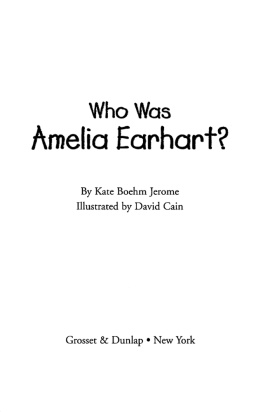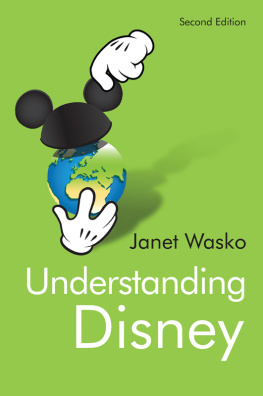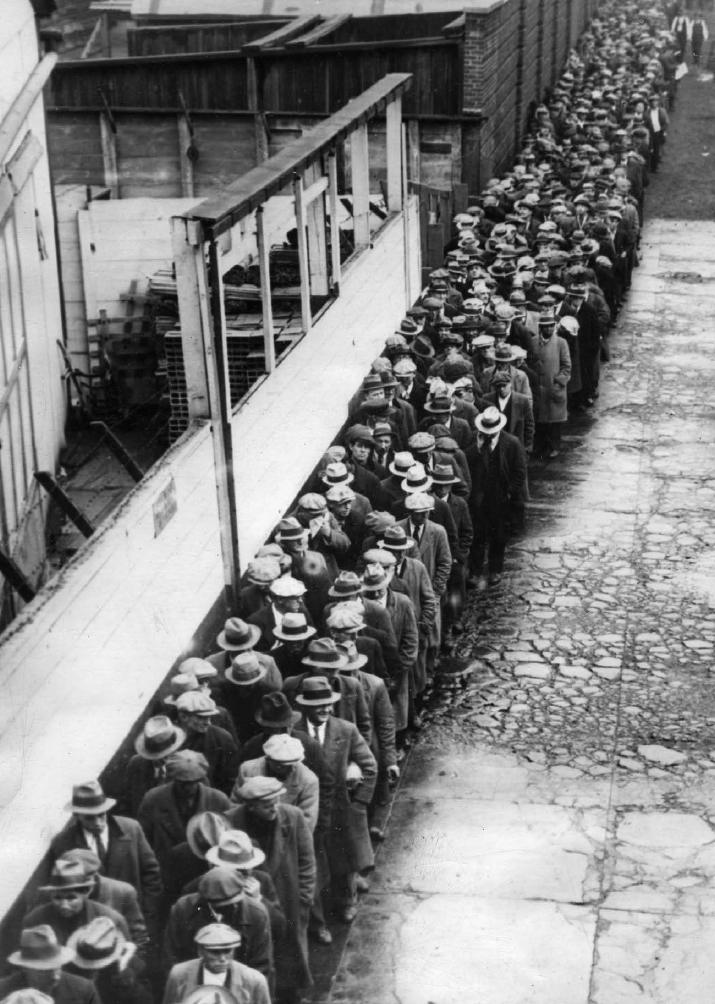Published in 2016 by Enslow Publishing, LLC.
101 W. 23rd Street, Suite 240, New York, NY 10011
Copyright 2016 by Enslow Publishing, LLC.
All rights reserved.
No part of this book may be reproduced by any means without the written permission of the publisher.
Library of Congress Cataloging-in-Publication Data
Feinstein, Stephen.
The 1930s / Stephen Feinstein.
pages cm. (Decades of the 20th and 21st centuries)
Includes bibliographical references and index.
Summary: Discusses the decade 1930-1939 in the United States in terms of culture, art, science, and politicsProvided by publisher.
Audience: Grade 9 to 12.
ISBN 978-0-7660-6926-8
1. United StatesCivilization1918-1945Juvenile literature. 2. United StatesPolitics and government1933-1945Juvenile literature. 3. United StatesPolitics and government1929-1933Juvenile literature. 4. Nineteen thirtiesJuvenile literature. I. Title.
E169.1.F3549 2015
973.916dc23
2015010945
Printed in the United States of America
To Our Readers: We have done our best to make sure all Web sites in this book were active and appropriate when we went to press. However, the author and the publisher have no control over and assume no liability for the material available on those Web sites or on any Web sites they may link to. Any comments or suggestions can be sent by e-mail to .
Photo Credits: Abbie Rowe/PhotoQuest/Getty Images, pp..
Cover Credits: Everett Historical/Shutterstock.com (soup line); Franklin D. Roosevelt Presidential Library & Museum (FDR); Keystone-France/Gamma-Keystone via Getty Images (Amelia Earheart); Library of Congress, Prints & Photographs Division (Jesse Owens).
Contents
Introduction
Pop Culture, Lifestyles, and Fashion
Entertainment and the Arts
Sports
National and International Politics
Advances in Science, Technology, and Medicine
Conclusion
Timeline
Glossary
Further Reading
Index
Herbert Hoover served as president during the Great Depression.
Introduction
The 1930s were a troubled time. America and the world were trapped in the Great Depression. Many people had little or no money. They struggled just to find food. Some families lived in cardboard shacks. It was one of the worst economic crises in history. At the time, few people understood how the Great Depression had happened. Nobody knew when it would end.
The previous decade had been a wild and happy timethe Roaring Twenties. People spent money freely. They fell deep into debt. Their actions were creating unseen problems. The economy was weakening. In 1929, the US stock market crashed. It was the first crisis of the Great Depression. More crises quickly followed. The financial ruin spread across the globe.
At first, President Herbert Hoover did not seem to see how big the problem was. On March 7, 1930, he promised that the Depression would be over in sixty days. Instead, the country sank deeper into the Depression. One by one, businesses failed. The unemployed searched in vain for new jobs. Some sold apples on street corners. Others begged. Families were faced with the threat of starvation. They stood in long lines, hoping to get a free loaf of bread or cup of soup. Banks failed, and many customers lost their life savings.
In 1932, American voters elected a new president, Franklin D. Roosevelt. The fifty-year-old New Yorker was confident. He told Americans that their government had not abandoned them. Roosevelts efforts would forever change the role of the federal government in the United States.
Unlike Hoover, Roosevelt did not hesitate in taking decisive action to restart the economy. He created a bold plan called the New Deal. Roosevelt constantly talked to the nation on the radio. He spoke in plain words, and his firm voice soothed peoples fears. They knew that someone was working hard to help them. Roosevelt always ended his radio talks with a message of encouragement. In short, he gave Americans hope. Americans would reelect Roosevelt four times.
Despite President Roosevelts efforts, however, the Depression lingered for many years. People grimly went about their lives. They turned to music, movies, and sports to forget about their troubles. They also took pleasure in reading. Newspapers told of heroes, such as the daring female pilot Amelia Earhart. They also reported on outlaws, such as Bonnie and Clyde. The kidnapping of a famous baby in 1932 made headlines. So did the fiery crash of a giant airship in 1937. For fiction, readers looked to cheap magazines called pulps. They also enjoyed the adventures of superheroes. Comic books first became popular in the 1930s.
In other countries, the Great Depression was creating political turmoil. In Germany and Japan, dangerous men used the chaos to strengthen their grip on power. These nations became hostile and warlike. As the 1930s drew to a close, the world plunged toward war. World War II began when Germany invaded Poland on September 1, 1939. It would become the deadliest conflict in human history.
Pop Culture, Lifestyles, and Fashion
In the 1930s, the US economy broke down. This era, known as the Great Depression, came as a sudden and great shock to Americans who had been enjoying the prosperity of the Roaring Twenties.
Breadlines and Soup Kitchens
Every day, millions of Americans in cities and towns all over the country waited patiently in long breadlines at soup kitchens to receive a bowl of soup and some bread. Soup kitchens were the only source of food some people had. In remote locations, such as the mountain towns of Appalachia where there were no soup kitchens, some families survived by eating dandelions and blackberries.
As more people lost their jobs, the breadlines grew longer. Still, some did not admit that something was terribly wrong. President Herbert Hoover kept trying to reassure the nation that everything would be fine. No one is actually starving, he proclaimed. In the fall of 1930, Hoover created the Presidents Emergency Committee for Employment (PECE). It did little beyond issuing misleading reports about the adequacy of local relief efforts. Hoover, a self-made millionaire, sincerely believed that any further government attempts to fix what he saw as a temporary setback in the economy would only hurt Americas greatness. He and others like him believed America was built on hard work, honesty, and the independence of the individual.
Americans waited in line for hours for a bowl of soup and piece of bread.
By May 1931, however, Hoover could no longer ignore the crisis. Still, he did not want the federal government to lend a helping hand. Hoover thought government charity would rob people of the motivation to take care of themselves. The way to the nations greatness is the path of self-reliance, he said. He called for acts of charity by individuals and private enterprise to solve the nations problems. One citizen who heeded Hoovers request was gangster Al Scarface Capone, who set up a soup kitchen in Chicago.
Solutions to Homelessness

